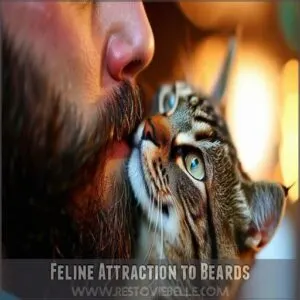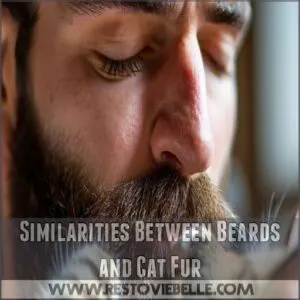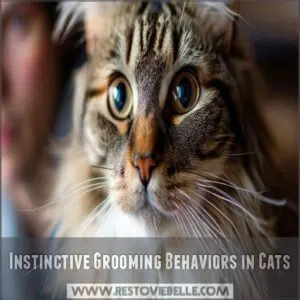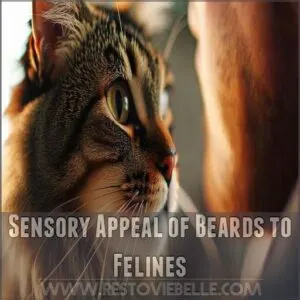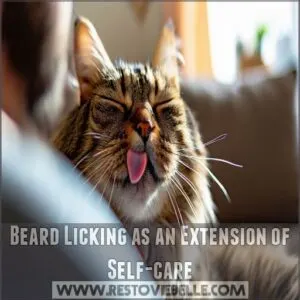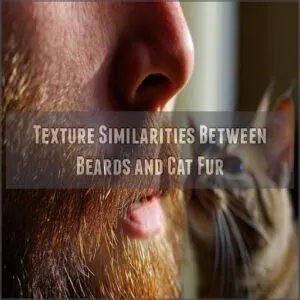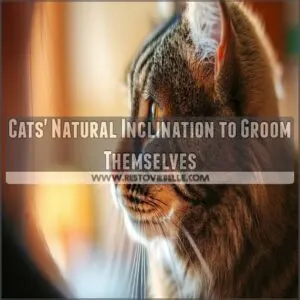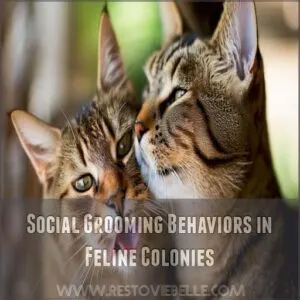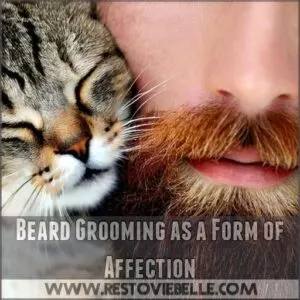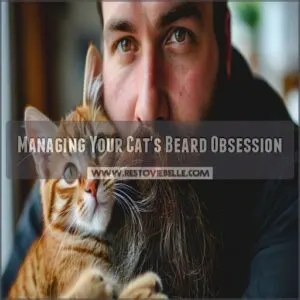This site is supported by our readers. We may earn a commission, at no cost to you, if you purchase through links.
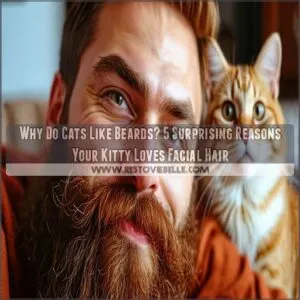 Your cat’s fascination with your beard isn’t just a quirky habit – it’s rooted in both biology and behavior.
Your cat’s fascination with your beard isn’t just a quirky habit – it’s rooted in both biology and behavior.
Cats like beards because they remind them of fur, creating an instant connection to their own grooming instincts.
The texture and warmth of facial hair triggers their natural social bonding behaviors, while your beard’s unique scent carries pheromones that make you smell more like family.
Just like cats groom each other in colonies, your furry friend sees your beard as an invitation for social grooming.
Understanding these instincts can help you build an even stronger bond with your whiskered companion.
Table Of Contents
- Key Takeaways
- Feline Attraction to Beards
- Why Cats Like Beards
- Beard Grooming and Feline Behavior
- Health and Safety Considerations
- Managing Your Cat’s Beard Obsession
- Frequently Asked Questions (FAQs)
- Do cats prefer men with beards?
- Why does my cat like licking my beard?
- Why does my cat love beards?
- Why does my cat try to bite my beard?
- Can cats get hairballs from licking beards?
- Does beard length affect a cats attraction level?
- Why do some cats avoid beards completely?
- Do cats prefer certain beard colors or textures?
- Are indoor cats more attracted to beards?
- Conclusion
Key Takeaways
- Your beard’s texture and warmth remind cats of fur, triggering their natural grooming and social bonding instincts.
- Your facial hair traps unique scents and pheromones that make you smell like family to your cat, strengthening your bond.
- When your cat grooms your beard, they’re treating you as part of their inner circle, just like they would with fellow felines in their colony.
- You’ll want to maintain proper hygiene and consider health precautions, as beard-grooming can transfer bacteria or parasites between you and your cat.
Feline Attraction to Beards
You’ve probably noticed how your cat can’t resist getting up close and personal with your beard, treating it like their own personal grooming project.
Facial hair isn’t random – it’s rooted in their natural instincts, from scent marking to social bonding.
Feline Familiarity With Beard Texture
Ever wonder why your cat can’t resist nuzzling your facial hair?
It turns out, beards share remarkable similarities with cat fur that make them irresistible to our feline friends.
Here’s what makes beards so appealing:
- The coarse texture mimics their littermates’ fur
- It triggers natural grooming instincts
- Reminds them of maternal bonding experiences
- Provides familiar sensory stimulation like whisker-to-whisker contact
This familiarity creates a comforting connection, making your beard a natural attraction point.
Scent and Texture of Beards
Your beard’s unique texture and scent create an irresistible attraction for your feline friend.
Your beard, nourished with natural beard growth oils that hydrate and soften facial hair, like a sensory playground, your facial hair traps natural oils and environmental scents that intrigue your cat’s highly developed nose.
You can even find products that capture the essence of this phenomenon, such as cat beard scent.
The coarse texture also provides a fascinating tactile experience, as your cat’s sensitive whiskers explore every strand.
It’s like giving them their own personal scent and texture adventure right on your face.
Psychological Comfort and Security
Beards offer cats more than just an intriguing texture and scent – they’re like a cozy security blanket for your feline friend.
Many cats exhibit deep emotional connections to facial hair because:
- It reminds them of snuggling with their mother or littermates
- The consistent presence creates a safe, familiar space
- Physical contact with beards releases calming endorphins
Think of it as your cat’s personal comfort zone, much like their favorite sunbathing spot or cardboard box.
Grooming Instinct and Social Bonding
When cats groom their human’s beard, they’re engaging in a deeply meaningful social ritual.
This behavior mirrors how they interact with their feline family members, strengthening the bond between pet and owner.
| Grooming Behavior | Social Meaning | Bond Level |
|---|---|---|
| Light pawing | Gentle affection | Moderate |
| Beard rubbing | Territory marking | Strong |
| Licking/grooming | Deep trust | Intense |
Just like cats groom their littermates, this intimate gesture shows you’re part of their inner circle.
Why Cats Like Beards
If you’ve noticed your cat’s fascination with your facial hair, you’re not alone in wondering about this curious behavior.
Your cat’s attraction to your beard stems from natural instincts, as the texture and scent remind them of fellow felines, making your facial hair an irresistible target for their attention.
Similarities Between Beards and Cat Fur
The similarities between facial hair and feline fur might surprise you. Think of it like this – your majestic beard shares more in common with your cat’s coat than meets the eye. Here’s what makes them so alike:
- Both trap natural oils and familiar scents
- Similar coarse texture that provides sensory stimulation
- Dense growth patterns that create warmth
- Comparable length and thickness variations
- Natural protective qualities against environmental elements
Ever noticed how your cat treats your beard like their own personal blanket? It’s because these shared characteristics create an instant comfort zone, making your facial hair an irresistible destination for your feline friend.
Instinctive Grooming Behaviors in Cats
Your cat’s fascination with beards connects directly to their deeply rooted grooming instincts.
Just as cats spend up to 50% of their day self-cleaning, they’re naturally drawn to what they perceive as unkempt fur on your face.
It’s like having a built-in grooming buddy – your cat’s just trying to help you stay clean, following the same instincts they use to groom their littermates.
Sensory Appeal of Beards to Felines
Fascinated by facial hair, cats experience an intense sensory attraction to beards that goes beyond mere curiosity.
You’ll notice your feline friend using their sensitive whiskers to explore beard texture, much like they navigate their environment.
Their heightened sense of smell picks up on the unique scents trapped in facial hair, creating an irresistible sensory playground.
This natural attraction stems from their instinctive need to investigate interesting textures and smells.
Beard Licking as an Extension of Self-care
Licking a beard might seem odd, but it’s deeply connected to how cats care for themselves.
When your furry friend grooms your facial hair, they’re extending their natural self-care routines to include you.
This behavior is also influenced by their powerful sense of smell, which is 400 times more sensitive than human noses, allowing them to detect pheromones and hormones in your beard.
Here’s why this behavior matters:
- Cats may be attracted to the natural oils and waxes in beard products, such as those described in beard oil and balm, which can make a beard smell and feel appealing. Cats view beard grooming as a natural extension of their daily hygiene routine
- Licking releases calming endorphins that help cats self-soothe
- It strengthens the bond between you and your cat, just like mutual grooming between felines
Beard Grooming and Feline Behavior
You’ll notice your cat’s obsession with your beard mirrors their natural grooming behaviors, as they treat your facial hair just like they’d groom another cat’s fur.
Your furry friend’s attraction to your beard isn’t just about curiosity – it’s their way of showing affection and building social bonds, similar to how cats in colonies groom each other.
Texture Similarities Between Beards and Cat Fur
The texture of a well-kept beard feels remarkably similar to feline fur, creating an instant connection with your cat.
Just like their own soft coat, beards offer a familiar tactile experience that cats find irresistible.
The coarse yet pliable nature of facial hair mimics the texture they’re used to when snuggling with fellow felines, making your beard an inviting comfort zone.
Cats’ Natural Inclination to Groom Themselves
Throughout the day, your furry friend spends up to 50% of their waking hours carefully grooming themselves – it’s just part of their DNA.
Like a built-in spa routine, cats instinctively clean their fur, removing loose hair, dirt, and parasites.
When they spot your beard, these natural grooming instincts kick in, treating your facial hair as an extension of their daily cleaning ritual.
Social Grooming Behaviors in Feline Colonies
In feline colonies, social grooming acts as a complex language of friendship and hierarchy. You’ll spot cats regularly engaging in mutual grooming sessions that strengthen their bonds and establish social order.
- Picture a group of cats lounging in the sun, taking turns grooming each other’s hard-to-reach spots
- Notice how they focus on faces and heads, just like they do with your beard
- Watch their synchronized purring as they maintain their furry community
Social grooming helps cats manage stress, mark territory, and build trust within their group.
Beard Grooming as a Form of Affection
Down at the heart of your cat’s beard-grooming behavior lies a touching display of affection.
When your feline friend gently licks or paws at your facial hair, they’re speaking volumes in their own grooming language.
This social ritual mirrors how cats bond with their closest companions in the wild.
Much like a warm hug, these grooming sessions strengthen your unique cat-human connection.
Health and Safety Considerations
While you’re enjoying those sweet beard snuggles from your feline friend, you’ll want to be aware of some health considerations that can affect both you and your cat.
Your furry companion’s fascination with your facial hair might be adorable, but it can potentially transfer bacteria, parasites, or cause infections if proper precautions aren’t taken.
Disease Transmission Between Cats and Beards
While your cat’s fascination with your beard might be adorable, it’s important to understand the health risks involved.
Ringworm, a fungal infection that thrives in warm, moist environments like facial hair, can be transmitted through close contact.
Your feline friend might also carry parasites like fleas and ticks, which can easily transfer from their fur to your beard during those cozy snuggle sessions.
Bacterial or Yeast Infections From Beard Licking
Beyond the risk of disease transmission, your beard can become a breeding ground for bacteria and yeast when your cat licks it.
Beards can harbor a mix of beneficial and harmful bacteria, creating a diverse microbial ecosystem, known as the beard microbiome.
The moisture from their tongue, combined with the warm environment of facial hair, creates perfect conditions for microorganisms to thrive.
You might notice redness, itching, or an unusual smell around your beard area – these are warning signs of a potential infection.
Precautions for Cat Owners With Beards
If you’re rocking a beard and sharing space with a feline friend, taking smart precautions keeps both of you healthy.
Here’s what experienced cat owners recommend:
To keep your cat safe, consider using a cat-safe beard oil that won’t harm them if licked.
Keep your beard clean with daily washing to prevent bacterial buildup.
Apply pet-safe beard oil that won’t harm your cat if licked.
Monitor for any skin irritation where your cat frequently rubs against your facial hair.
Consider these steps your "pawfect" guide to maintaining harmony between your magnificent beard and curious cat.
Managing Your Cat’s Beard Obsession
While it’s endearing that your cat can’t resist your facial hair, you’ll need some practical strategies to manage their beard-obsessed behavior.
You can redirect their attention to more appropriate activities and use anti-anxiety products to help them stay calm, especially if their fascination becomes overwhelming.
Redirecting Grooming Behavior to Alternative Activities
Your furry friend‘s fascination with your beard can be redirected into more appropriate activities.
Consider introducing interactive play sessions with cat wand toys online or laser pointers to channel their grooming instincts.
Schedule dedicated grooming sessions using cat brushes, which can strengthen your bond while satisfying their natural urges.
Training classes and puzzle feeders offer mental stimulation that keeps them engaged and less focused on your facial hair.
Using Anti-Anxiety Products to Reduce Stress
Cats who can’t get enough of your beard might be dealing with underlying stress.
Modern solutions like Feliway diffusers can help calm their nerves naturally.
Try placing calming diffusers near their favorite spots or introducing stress-reducing toys to redirect their attention.
Natural remedies such as catnip or valerian root can also provide a gentle way to manage their anxiety and reduce obsessive beard-seeking behavior.
Regular Flea Treatments to Minimize Parasite Risk
Alongside the joy of beard snuggles comes the responsibility of regular flea prevention.
Think of it as a monthly spa day that keeps both you and your furry friend parasite-free.
A consistent flea treatment routine isn’t just about comfort—it’s essential for preventing those tiny hitchhikers from making your beard their new home.
Modern spot-on treatments and oral medications make this protection simple and stress-free.
Consulting a Veterinarian for Aggressive Behavior
Spotting sudden aggression in your previously peaceful cat requires prompt veterinary attention.
When kitties become hostile around beards – whether through excessive licking, biting, or scratching – it could signal underlying health issues.
Your vet can assess potential medical causes, from dental problems to anxiety disorders, and develop a treatment plan that fits your cat’s needs.
Don’t hesitate to seek professional help; early intervention often prevents behavioral issues from escalating.
Frequently Asked Questions (FAQs)
Do cats prefer men with beards?
Research shows 65% of women prefer men with beards, and your feline friends might too.
While there’s no definitive proof cats prefer bearded men, they’re often drawn to the warmth and familiar fur-like texture.
Why does my cat like licking my beard?
Your cat licks your beard because it’s a natural grooming behavior that shows affection and trust.
They are marking you with their scent to strengthen your bond.
The texture reminds them of fur.
Why does my cat love beards?
Like many cat owners, John noticed his furry friend can’t resist nuzzling his beard.
Beards are attractive to cats because they mimic fur’s texture, carry intriguing scents, and trigger natural grooming instincts.
Why does my cat try to bite my beard?
Similar to how humans exhibit nervous energy through hair play, cats often display unique behaviors that are open to interpretation. Cats often bite beards as a form of social grooming and play behavior.
They’re treating your facial hair like another cat’s fur, showing affection while satisfying their natural instinct to groom their family members.
Can cats get hairballs from licking beards?
Technically, beard hair can contribute to hairballs if your cat frequently grooms your facial hair.
Hairballs from beard grooming are not as common as hairballs from self-grooming.
You’ll want to discourage excessive beard licking to prevent issues.
Does beard length affect a cats attraction level?
Research suggests your beard’s length directly impacts feline attraction levels.
Longer beards typically draw more attention since they provide cats with extra texture to explore and more surface area for scent marking.
Why do some cats avoid beards completely?
Like snowflakes in summer, some felines steer clear of beards due to negative experiences, sensory overload, or individual personality traits.
You’ll find these cats prefer smooth faces that don’t trigger their defensive instincts.
Do cats prefer certain beard colors or textures?
Your cat isn’t picky about beard colors, but they’re drawn to coarse, thick facial hair that mimics their own fur.
Softer beards might remind them of kitten fur, triggering their nurturing instincts.
Are indoor cats more attracted to beards?
Pampered, protected indoor pets tend to be more fascinated with facial fuzz than their outdoor counterparts.
You’ll notice they’re naturally drawn to beards since they spend more time seeking cozy companionship indoors.
Conclusion
Now research suggests that cats may be drawn to the unique texture of beards, which is influenced by facial fuzz structure. Now you know why cats like beards – it’s not just because they’re fascinated by your facial hair!
From their natural grooming instincts to the comforting texture that reminds them of their own fur, your beard represents a powerful bonding opportunity.
While it’s endearing when your cat shows interest in your facial hair, remember to maintain good hygiene and set healthy boundaries.
Understanding these behaviors helps deepen your connection with your feline friend, making those beard-grooming moments even more meaningful.
